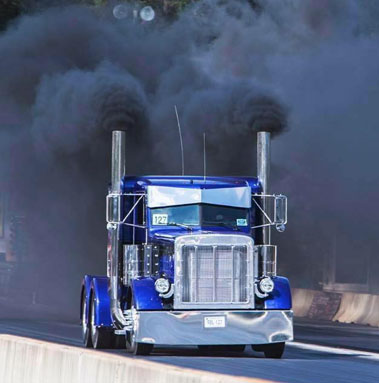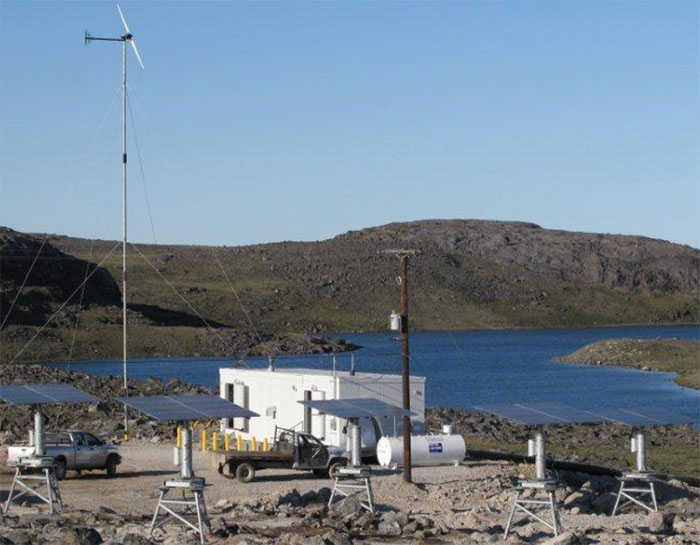|
|

|
  
Top Stories
Update 2020/1/11
Energy
TRADING SOOTY DIESEL FOR RENEWABLE ENERGY SYSTEMS IN CANADA'S NORTH
By George Thorpe
Diesel power generation and heating has been the standard in remote communities for many years. Most communities are off the electrical power grid, which means that diesel fuel must be freighted to each community at substantial expense by truck, ship or even aircraft. The burning process is inefficient with significant harmful greenhouse gases emitted to the environment, along with the noisy rumble of the diesel generator 24/7.
Excessive consumption of fossil fuel will not only gradually exhaust its availability in the earth but also cause severe climate change and environment pollution problems. It is well known that the burning of diesel produces harmful formaldehyde, sulphur dioxide, mercury and black soot.

Typical black soot exhaust emitted by diesel engines
Last year the diesel barge failed to deliver fuel to Paulatuk N.W.T. because of early ice. More than half a million liters of diesel had to be flown into the community to keep the generators producing power. This bill was close to $2 million and was ultimately paid for by the taxpayers of Canada. For some communities, air freight of fuel is common.
Diesel fuel spills happen from time to time and in the past were often unreported. It is estimated that more than 10 million liters of diesel has been spilled north of 55 degrees latitude. These incidents are costly, both from an environmental and economic view.
Several years ago in April the diesel generator in Pangnirtung caught on fire. During this time hospital patients were evacuated to Iqaluit and residents moved to central locations to keep warm.
Some residents can`t afford diesel to produce heat in their residences. Researchers have determined that respiratory illness, arthritis and mental illness increase for people living in the cold.
Another factor is that close to half of the diesel generators in the north are past their useful life and therefore trending toward unreliable.
Water and wastewater treatment plants, along with other community utilities, require a steady and reliable power source to provide resilience. Efficient and environmentally effective energy creation is essential to improve resilience, human health and the environment.
Once a geothermal, biofuel, wind or solar power system with battery backup is installed, very little shipping of goods to site is required. This removes most of the environmental damage caused by diesel powered ships and their resulting emissions.

Taloyoak water treatment plant has wind and solar alternate energy systems
Chris Henderson is Executive Director of non-profit Indigenous Clean Energy (ICE) Social Enterprise (chenderson@indigenouscleanenergy.com) and has started the 20-20 Catalysts program, which assists Canadian First Nation communities wanting to replace diesel. https://indigenouscleanenergy.com/2020-catalysts-program/
Henderson reports that Canada is on the cusp of a northern energy revolution. New investment is being committed to cleaner energy technologies in remote communities countrywide, anchored to three key pillars. He explains:
"The first is to adopt an integrated approach by building energy-efficient homes and optimizing the potential of local renewable wind, solar, hydro and bioenergy resources.
Second, it is essential that Indigenous Peoples play a central leadership role in developing clean energy to meet their needs. Proactive community planning and engagement is proving to be much more effective than top-down directives of the past.
Third, forging partnerships between Indigenous organizations, utilities and developers is of critical importance; drawing on the know-how of clean energy companies and the local knowledge of First Nations, Métis and Inuit peoples."
He also states the main problem well: "The different cost curves of diesel and clean energy stack the cards against change for many small and cash-strapped communities, even if it could mean long-run savings. Diesel generation requires only a modest up-front outlay of capital; 85 per cent of the cost is in ongoing fuel purchases. Clean energy projects like small hydro, by contrast, require big capital expenditures upfront. Positive economic returns over the longer term, such as net revenue for decades ahead — often do not influence the short-term decision."
There are still economic, regulatory and operational challenges with renewable energy systems, For example, the supply and demand of power needs to be balanced 24/7. Battery storage and other new technology assists in this task. A Remote Monitoring and Trending system also aids in troubleshooting and operator training.
In summary, many remote communities have started on the journey to replace diesel with alternate energy, but help is needed along the way.
Self-sufficiency is a natural value for people living in remote communities and alternate energy promotes this. The goal should be - clean air, clean water and peaceful quiet for all!
The Clean Energy for Rural and Remote Communities program supports a suite of diverse projects across Canada to reduce the reliance of rural and remote communities on diesel fuel for heat and power.
Also see The Atlas of Canada - Remote Communities Energy Database
George Thorpe, P.Eng. E.P. is Vice President of BI Pure Water Canada Inc. (georget@bipurewater.com)
|
|
|
Have a question? Give us a call 613-501-0175
All rights reserved 2025 - WATERTODAY - This material may not be reproduced in whole or in part and may not be distributed,
publicly performed, proxy cached or otherwise used, except with express permission.
|
| |